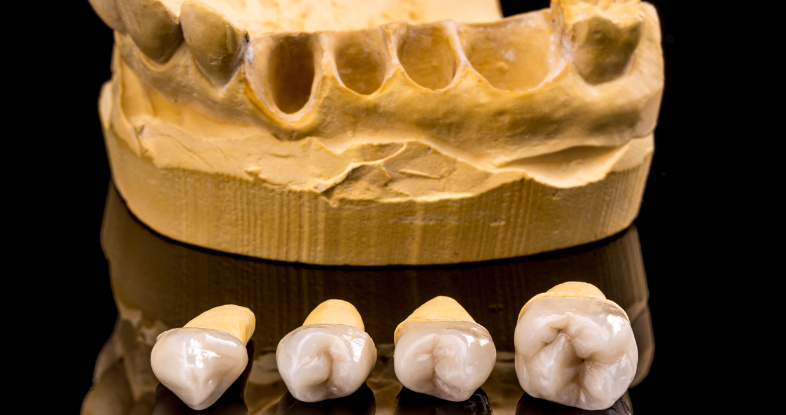Tooth loss is common as we age. In fact, more than 35 million people in the U.S. are missing their upper and lower teeth. For decades the most common solution has been being fitted for dentures. However, there are some disadvantages to dentures including limited food options, discomfort, and cleaning issues.
Today many people are opting for dental implants. First introduced in the 1970s, they are now a regular part of day-to-day dental practice.
The Academy of General Dentistry defines dental implants as artificial teeth “roots” surgically placed in your mouth. They’re composed of titanium and bone-like ceramic materials that are compatible with your jaw. Once surgically inserted, they fuse with the jawbone to support a crown, bridge, or full dentures. The most common implant is called an endosteal which is placed into the bone, followed by placement of a post and artificial tooth or teeth. For patients who can’t wear traditional dentures or who have inadequate bone height, subperiosteal implants are positioned above the jawbone.
Dental Implants vs. Dentures
This isn’t to say that dentures aren’t right for some people. While a positive dental solution for many, they do sometimes require drastic lifestyle changes. For example, dentures may affect how you eat and speak, and many wearers report they never feel quite like their natural teeth. Many others worry about whether the adhesives required to hold them in place will work properly.
Dental implants, on the other hand, don’t come loose like dentures can because they don’t need to be anchored to other teeth as bridges do. Implants also greatly benefit your general oral health.
Benefits of Dental Implants
The American Dental Association reports more than 5.5 million dental implant procedures are performed annually by dentists in the U.S. Here are just some of the reasons they are so popular.
- They don’t rely on neighboring teeth for support, so there’s no tooth structure loss like with a bridge.
- There’s no slippage because an implant has the same stability and security as your natural teeth. Since there’s no shifting of nearby teeth, the jawbone and contours of your face are preserved.
- Implants do not require adhesives to hold them in place.
- Your chewing and speaking abilities are more natural.
Another great advantage to dental implants is they’re cleaned the same way as your natural teeth. No more cleaning solutions or overnight soaking!
Are Dental Implants Right for You?
If your gums are healthy, your jawbone can support an implant, you’re in good general health, and you consistently clean and look after your teeth, you are probably an ideal candidate for dental implant surgery. There are a couple of caveats: some chronic illnesses like leukemia and diabetes can interfere with the healing process and smoking doubles the risk of implant failure.
Contact Harborview Dental Health For More Information About Dental Implants
Your smile is one of the first things people notice when you greet them. If you are unhappy or self-conscious about your smile, your dentist can provide you with several options to get you the beautiful smile you’ve always dreamed of. Restorative dental services and dental implants may be perfect for you.
At Harborview Dental Health, we know that choosing dental implants is a big step. We’re here to listen to your concerns, answer your questions, and help you decide whether they’re the right solution for you. Ready to learn more? Contact our dentist in Palm Harbor today at 727-785-4716 to schedule a consultation for gentle dental services.

